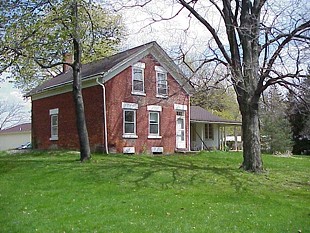Among Brown’s featured snippets was a woman who explained how deeply touched she’d been by researching the history of Look About Lodge at the Metroparks South Chagrin Reservation in Bentleyville. She helped then-manager Wendy Weirich successfully apply for placement on the National Register of Historic Places — Look About Lodge was added to the registry in April, 2006.
“I was able to write a section of the application” said Sandy Cobb, the retired librarian and Metroparks’ volunteer, in a recorded testimonial. “And I think that’s one of the most important things I’ve ever done.”
Look About Lodge is one of only two buildings in Bentleyville on the National Register. Earlier in the board meeting, notwithstanding the park district’s commitment to cultural and educational history, CEO Brian Zimmerman tried to justify demolishing the other one.
Here's the action item, right from the publicly available agenda:
For over seventeen years, Cleveland Metroparks has persevered in allowing the Village of Bentleyville and the Friends of Bentleyville to engage in restoration efforts of the house located at 35069 Cannon Road, which is referred to as the McFarland House. (Italics mine).
Metroparks has provided numerous opportunities to the Village and the Friends to complete the restoration of the McFarland House.
Unfortunately, given the safety issues posed, by the presence of lead paint and asbestos; the failure to obtain the required state building permit; and the failure to provide requested documentation since 2011, Cleveland Metroparks has exhausted its efforts for the Village or the Friends to restore the McFarland House on its property and recommends that the Board allow the Village or the Friends to remove the McFarland House from the South Chagrin Reservation within thirty (30) calendar days from today’s date if those parties have a desire to continue to pursue their restoration struggles. (Again, italics mine).
The staff further recommends that if the house is not removed within that specified time period, staff recommends that the demolition, which could have occurred at least ten years ago, be completed at this time.
My my!
At least ten years ago? That sure would’ve been awkward, PR-wise, as the McFarland House was only added to the National Register of Historic Places in 2001. Back then the Metroparks was on Bentleyville's team. A letter from the Ohio Historical Preservation Office (OHPO) to former Metroparks’ Director Vern Hartenburg congratulated him on the achievement and offered assistance down the road.
“As you know… there are no restrictions placed on your property following the National Register listing,” OHPO Department Head Barbara Powers wrote. “However, the OHPO strongly encourages the owners of historic properties to consider all options before completing work that could damage the structure or impair its historical integrity.”
Neither in the agenda nor in board meeting remarks was the McFarland House ever referred to as a structure with any historical value at all.
“The McFarland House was not brought up to code,” pretty adequately distills the Metroparks’ sentimental attachment.
Some quick background: The McFarland homestead, built in 1848 by pioneer Duncan McFarland, is one of the oldest structures in Bentleyville and represents a very rare (for the area) Greek Revival style. Among its unique features are a blown-glass transom above the doorway and an ornate wooden staircase. It sits within a Metroparks’ service facility area in the South Chagrin Reservation and has been vacant for more than 30 years.
Since the early 2000s, a small but committed group of locals, the “Friends of the Duncan McFarland Homestead,” has been sporadically renovating the property in rough accordance with its small but committed fundraising efforts. In 2009, after a hiatus, the “Friends,” a 501(c)3, reengaged their efforts when Bentleyville Mayor Leonard Spremulli forced the issue. With the help of restoration architecture firm Chambers, Murphy & Burge, volunteers created a plan to rehabilitate the property to its former (modest) splendor.
Volunteers replaced the roof, tuckpointed the chimney, cleaned out the basement, removed the kitchen and porch structures (later additions that weren’t in keeping with the original architectural style), and replaced the main living area floor and floor joists.
Cleveland.com reported that work on the home had become a popular activity for local boy scouts, who coordinated repair projects to obtain merit badges. John Bourisseau, president of Bentleyville City Council and a central player on the “Friends” team, said that three scouts received their Eagle Badges while working on the homestead.
The McFarland house issue is newsworthy, in the first place, because it got more than a moment of public discussion at a Metroparks board meeting. These days, CMP activities tend to be occluded by swift and/or promotional proceedings; dense financial information (rendered via thickets of spreadsheets and the itty-bittiest of fonts); and of course the backroom executive sessions where most of the important conversations go down, veiled on the publicly available agendas with “real property” and “personnel matter” labeling.
One can’t help but suspect, while sitting through these board meetings, that the kinks and concerns have already been uncoiled and aired, that the decisions regarding operations and big expenditures have already been made.
(Additional note: We love the petty bickering at Cleveland City Council meetings in part because it makes for great headlines, but much more importantly because the evident dysfunction indicates that they’re working out public problems in the public eye, which is of course the law).
Thursday, Brian Zimmerman got a little testy when Commissioner Bruce Rinker, the Mayfield Village mayor and MansourGavin attorney, began asking some sensible questions about the McFarland house. You know, things like: As the land owner, what’s our [i.e. the Metroparks] liability? Doesn’t 30 days seem awfully rushed to physically move a house that — according to Zimmerman — is in such disrepair? Has Bentleyville, or the Metroparks for that matter, suggested a landing spot for the home? Shouldn’t the Metroparks give Bentleyville some sort of formal notice?
Commissioner Debra Berry even suggested that if Bentleyville proved willing to cooperate, “if there was movement,” perhaps the Metroparks might entertain the idea of an extension.
“Should we put that in the motion now?” Rinker asked.
“I would rather keep it the way it is now,” responded Metroparks’ law director Rose Fini, “and then if there is, if they want to come forward. Because yes, 17 years is a long time. We’ve extended a lot of staff time as well. It’s a very important issue to us, but we do feel that we’ve invested so much staff time in this issue.”
Bentleyville stakeholders have characterized the relationship in more or less opposite terms. While Zimmerman and his underlords have called Bentleyville unresponsive and, at times, apathetic — and to be fair, the restoration efforts have been moving at an injured snail’s pace — John Bourisseau told Scene that volunteers have been handcuffed from making the progress they’d like to.
“From the first meeting we had with [CMP Special Projects Coordinator] Nancy Desmond, it was real clear that they didn’t want anything to do with this,” Bourisseau said.
After a lease agreement in 2010, the Friends and volunteers engaged in substantial renovations, but it wasn’t sufficient in the Metroparks' view.
“The new [Zimmerman] administration at the Metroparks imposed a whole set of new requirements for us to be able to continue our renovation efforts. They now said we needed a permit from the state, we needed complete architectural drawings, we needed to demonstrate that we could raise sufficient funds to finish the project and they expressed concern that the presence of asbestos and lead paint made the building unsafe,” read a letter from last week signed by Bourisseau, law director Mary Oakar and Mayor Spremulli to the Metroparks commissioners.
“We weren’t even aware we needed a permit with the state,” Bourisseau told Scene. “We were just renovating the place. And why did they want full architectural drawings? We’re just replacing plaster, we’re just painting. But they were real non-responsive.”
When asked what specific permit Bentleyville was required to obtain for renovations, Metroparks Chief Marketing Officer Sanaa Julien — current media liaison — wrote in an email that “buildings are required to adhere to all Ohio building codes.”
When asked the reason for the urgency, and whether or not any reps from Bentleyville had been invited to the relevant Metroparks' board meeting, Julien responded that “the activities that led to current requirements have been occurring for 17 years.”
Bourisseau said that though he’d met with Zimmerman and the CMP Special Projects team in the past, he hadn’t been invited (nor indeed, had even been made aware) that the McFarland House issue would be discussed Thursday.
Bourisseau added that the current focus on asbestos is a red herring.
“It gets people who don’t have an understanding of the process to raise an eyebrow,” he said, “but it’s not a dangerous situation. No one was ever put in any danger. If you go in and start tearing it apart, sure it’s dangerous. There were a couple pipes in the basement wrapped in asbestos, but that was the extent of it.”
Ken Kvacek, another Bentleyville Village councilman and Friend of the Duncan McFarland House, concurred.
"If they want to demolish every structure with trace elements of asbestos, they're going to have to tear down 70 percent of the housing stock in the county," he said. "And prior to 1970, lead paint was what you used. It sure was used on railings at the zoo. You know how you remediate that? You paint over it."
Zimmerman, defending demolition, called the McFarland house an “attractive nuisance” situation.
"When someone wants to get rid of your property, the first thing they do is start talking about the asbestos," said Kvacek.
At any rate, the Metroparks hasn’t let anyone on the property since their experts uncovered the presence of asbestos. That’s fair enough, if they are indeed worried about liability. Except how can Bentleyville be expected to renovate the house if volunteers aren’t permitted on the premises?
While Zimmerman said at Thursday’s board meeting that the Metroparks have received nothing in the way of communication from Bentleyville over the past two years, Bentleyville tells a different story. From their letter:
“All of our attempts to mediate a workable agreement over the past two years have met with the same response from Brian Zimmerman. Basically “Do it my way, or we’ll tear it down!” Two weeks ago, the Parks demolished a small carriage barn that both the Metroparks and Village had determined to have historical significance 15 years ago. It was in very bad condition, but we were unable to work on it because of the prohibitions placed upon us by Mr. Zimmerman.”
(The carriage barn was another “attractive nuisance” situation, Zimmerman mentioned in the board meeting, though he failed to disclose that the demolition occurred only two weeks prior).
“Throughout all of our interactions with Mr. Zimmerman and his staff, we felt our efforts were belittled. We were treated like children, who just didn’t understand how important the park staff were. We were taking up their valuable time. Then they became the bully on the block. Play it my way, or I am taking my ball and going home—all the while complaining about how difficult it was to work with ‘affiliates.’
The bottom line here, is because of the arrogance and intransigence of the Metroparks administration, a small group of dedicated individuals trying to save a historically significant structure are in danger of seeing it lost forever.”
At its April meeting, the Bentleyville Village Council passed a resolution, “requesting that the [Metroparks] enter into a lease agreement with the Village of Bentleyville to ensure continued restoration and to prevent destruction of the 1850’s Duncan McFarland Home.”
Zimmerman responded with a letter — which was purportedly vague, though Scene didn't manage to obtain a copy — and then obviously went ahead with the demolition action item at last week's meeting.
On Friday, however, Zimmerman spoke at length with Bentleyville Mayor Leonard Spremulli. Councilmembers who spoke with Spremulli afterward said he seemed encouraged that a dialogue had been opened and that he would likely share his thoughts at next Wednesday's Bentleyville Village Council meeting.
"What I want to know is, does this mean [the Metroparks] are going to be supportive in any way?" said Ken Kvacek in a phone call with Scene. "Does this mean there's going to be a stay of demolition for x period of time? And under what conditions?"
Physically moving the house seems an unlikely solution, unless the Metroparks chip in. Bentleyville would need to hire a structural engineer and find a new location for the homestead.
"It's just too expensive," suggested Bourisseau.
And Kvacek frankly isn't all that encouraged by the prospect of more "dialogues" with the Metroparks.
"From my experience, [Zimmerman] says 'here's my agenda.' He loads up a bunch of people in the room and then whenever you respond to an item, he finds someone to refute it. It's not a meeting; it's a presentation of his agenda."
When asked if there would be a stay of demolition due to ongoing conversations with Bentleyville leadership, the Metroparks said no.
"The status has not changed and there seems to be ample time to come to a resolution before the end of the term," Julien said.














